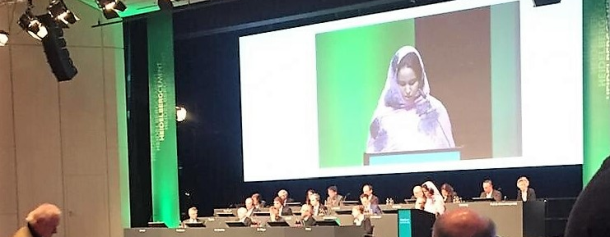
The Swedish truck company Scania, part of Volkswagen, offers services in occupied Western Sahara.
Picture above: Scania trucks parked in the industrial zone south of the city of Dakhla, occupied Western Sahara, before transporting fisheries products out of the territory. Download original picture of five Scania trucks here. The trucks carry the labels of Moroccan transport companies. Photo by @ElliLorz, taken in February 2016.
Through the years, Western Sahara Resource Watch (WSRW) has occasionally received reports of Scania trucks in the part of Western Sahara that is under foreign Moroccan occupation.
Scania is a Swedish truck company, part of Traton SE, known as the Traton Group (formerly Volkswagen Truck & Bus AG), which in turn is a subsidiary of the Volkswagen Group.

Scania's role in the territory was however unclear.
Theoretically, WSRW has considered two scenarios: either Scania offered services in Morocco proper, and their clients chose to use the trucks in Western Sahara, or Scania itself has been offering services in the territory.
It seems now that the latter would be the case. Scania's social media accounts and website indicate that it does indeed have some sort of operational activities in the territory.

“Scania in Morocco is conducting business in the region and is running a minor workshop in Dakhala (sic). All Scania trucks in the region are sold for unmilitary/civil use. Scania recognises international humanitarian law and business and human rights standards. We continuously improve processes and review operations in line with these standards and input from stakeholders, including the materials shared. Regarding the map, we have decided to update the current version,” Scania PR manager Erik Bratthall told in a response to a letter sent from WSRW and the Swedish NGO Artikel2 (until recently named Emmaus Stockholm), on 14 June 2023. The last sentence in the quote is in reference to a map displayed on Scania's website that depicted Western Sahara as part of Morocco.
A follow-up letter from WSRW/Article2 was sent on 12 July, and the company responded on 10 August 2023 with the following: “We appreciate your engagement in this matter and see your input and questions as an opportunity to learn and improve. Scania recognises its responsibility to respect human rights, as outlined in our human rights policy, and we are also committed to acting in line with international humanitarian law. For the sake of clarity, the reference to 'region' in my previous response referred to a broader region within Scania referring to the Middle East, Africa and Central Asia. We are currently conducting an analysis from a human rights and humanitarian law perspective.”
As such, the company has not responded to the questions asked by the two associations.
This is not the first time WSRW writes about the Volkswagen family. In 2015, MAN Diesel & Turbo obtained a contract in the occupied territory by the Moroccan government for four diesel generators with a combined power of 72 MW. WSRW wrote MAN Diesel & Turbo on 26 June 2015. The company responded on 10 July 2015.
A large part of Western Sahara has been illegally occupied by Morocco since 1975.




Since you're here....
WSRW’s work is being read and used more than ever. We work totally independently and to a large extent voluntarily. Our work takes time, dedication and diligence. But we do it because we believe it matters – and we hope you do too. We look for more monthly donors to support our work. If you'd like to contribute to our work – 3€, 5€, 8€ monthly… what you can spare – the future of WSRW would be much more secure. You can set up a monthly donation to WSRW quickly here.
MAN Diesel & Turbo to aid Morocco in electrification of occupied land
German powerhouse MAN Diesel & Turbo has been contracted by the Moroccan government to extend the diesel generators in El Aaiun, occupied Western Sahara.
New report: Western Sahara phosphate trade halved
The export of phosphate rock from occupied Western Sahara has never been lower than in 2019. This is revealed in the new WSRW report P for Plunder, published today.
'We deserve an answer' from HeidelbergCement
When requesting answers on human rights from HeidelbergCement with regard to its operations in occupied Western Sahara, Saharawi Khadja Bedati was told that the company "deliberately makes social sponsoring of various sports clubs".
New report on Western Sahara phosphate industry out now
Morocco shipped 1.93 million tonnes of phosphate out of occupied Western Sahara in 2018, worth an estimated $164 million, new report shows. Here is all you need to know about the volume, values, vessels and clients.



